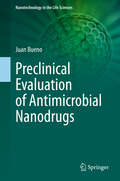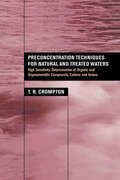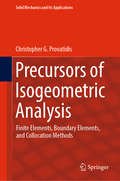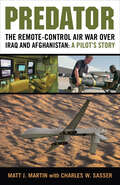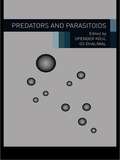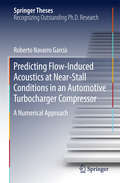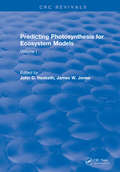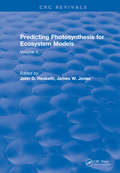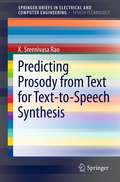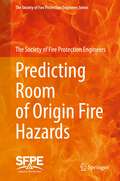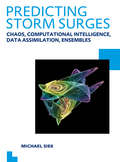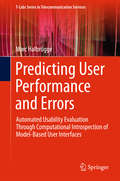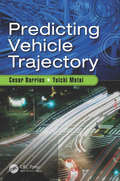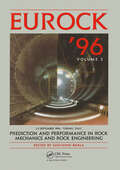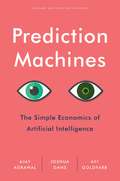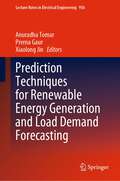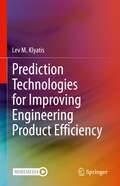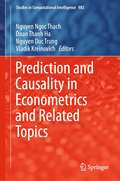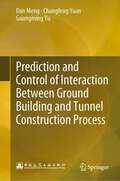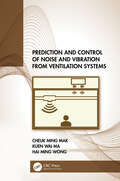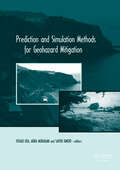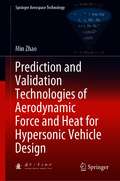- Table View
- List View
Preclinical Evaluation of Antimicrobial Nanodrugs (Nanotechnology in the Life Sciences)
by Juan BuenoTranslational medicine addresses the gap between research and the clinical application of new discoveries. To efficiently deliver new drugs to care centers, a preclinical evaluation, both in vitro and in vivo, is required to ensure that the most active and least toxic compounds are selected as well as to predict clinical outcome. Antimicrobial nanomedicines have been shown to have higher specificity in their therapeutic targets and the ability to serve as adjuvants, increasing the effectiveness of pre-existing immune compounds. The design and development of new standardized protocols for evaluating antimicrobial nanomedicines is needed for both the industry and clinical laboratory. These protocols must aim to evaluate laboratory activity and present models of pharmacokinetic-pharmacodynamic and toxicokinetic behavior that predict absorption and distribution. Likewise, these protocols must follow a theranostics approach, be able to detect promising formulations, diagnose the infectious disease, and determine the correct treatment to implement a personalized therapeutic behavior. Given the possibilities that nanotechnology offers, not updating to new screening platforms is inadequate as it prevents the correct application of discoveries, increasing the effect of the valley of death between innovations and their use. This book is structured to discuss the fundamentals taken into account for the design of robust, reproducible and automatable evaluation platforms. These vital platforms should enable the discovery of new medicines with which to face antimicrobial resistance (RAM), one of the great problems of our time.
Preconcentration Techniques for Natural and Treated Waters: High Sensitivity Determination of Organic and Organometallic Compounds, Cations and Anions
by T.R. CromptonEquipment used for the analysis of water is frequently insufficiently sensitive to be able to detect the low concentrations of organic and inorganic substances present in samples. Applying preconcentration to the sample prior to analysis means the results gained are more accurate and can be used to report trends more effectively. Each chapter of Pr
Precursors of Isogeometric Analysis: Finite Elements, Boundary Elements, and Collocation Methods (Solid Mechanics and Its Applications #256)
by Christopher G. ProvatidisThis self-contained book addresses the three most popular computational methods in CAE (finite elements, boundary elements, collocation methods) in a unified way, bridging the gap between CAD and CAE. <P><P>It includes applications to a broad spectrum of engineering (benchmark) application problems, such as elasto-statics/dynamics and potential problems (thermal, acoustics, electrostatics). It also provides a large number of test cases, with full documentation of original sources, making it a valuable resource for any student or researcher in FEA-related areas. <P><P>The book, which assumes readers have a basic knowledge of FEA, can be used as additional reading for engineering courses as well as for other interdepartmental MSc courses.
Predator: The Remote-Control Air War Over Iraq and Afghanistan: A Pilot's Story
by Charles W. Sasser Matt J. MartinThe Nintendo generation has taken to the battlefields of Iraq and Afghanistan where remotely controlled aircraft are killing America¹s enemies and saving American lives.Matt J. Martin is considered a "top gun" in the world of unmanned aerial vehicles (UAVs). For nearly four years, he has flown hundreds of missions on two warfronts in a new kind of combat that, until recently, was largely classified Top Secret. He and his fellow Predator pilots have been actively involved in virtually every facet of the War on Terror in Iraq and Afghanistan: tracking Osama bin Laden; capturing top al-Qaeda leader al-Zarqawi; fighting with the U.S. Marines in Fallujah; and rescuing aid workers kidnapped in Afghanistan by the Taliban.This is Matt J. Martin's story and that of his aircraft, the 27-foot long Predator.
Predators and Parasitoids (Advances In Biopesticide Research Ser. #Vol. 3)
by Opender Koul G. S. DhaliwalTheir natural enemies largely determine the population size and dynamic behavior of many plant-eating insects. Any reduction in enemy number can result in an insect outbreak. Applied biological control is thus one strategy for restoring functional biodiversity in many agroecosystems. Predators and Parasitoids addresses the role of natural enemies i
Predict and Surveil: Data, Discretion, and the Future of Policing
by Sarah BrayneThe scope of criminal justice surveillance has expanded rapidly in recent decades. At the same time, the use of big data has spread across a range of fields, including finance, politics, healthcare, and marketing. While law enforcement's use of big data is hotly contested, very little is known about how the police actually use it in daily operations and with what consequences.
Predicting Flow-Induced Acoustics at Near-Stall Conditions in an Automotive Turbocharger Compressor
by Roberto Navarro GarcíaThis thesis offers new insights into the fluid flow behavior of automotive centrifugal compressors operating under near-stall conditions. Firstly it discusses the validation of three-dimensional computational fluid dynamics (CFD) unsteady simulations against acoustic experimental measurements using an original procedure based on plane wave pressure decomposition. It then examines the configuration of the CFD cases, highlighting the key parameters needed for a successful calculation. Moreover, it describes both the compressor mean and unsteady flow field from best-efficiency to near-surge operating points. Lastly, it provides readers with explanations of the various phenomena that arise when the mass flow rate is reduced and the compressor is driven to poor and noisy performance. Written for students, researchers and professionals who want to improve their understanding of the complex fluid flow behavior in centrifugal compressors, the thesis offers valuable practical insights into reducing the acoustic emissions of turbochargers.
Predicting Outcomes of Investments in Maintenance and Repair of Federal Facilities
by Committee on Predicting Outcomes of Investments in Maintenance Repair for Federal Facilities"Challenging. . . The real value of this book is in Mr. Hacker's calm, analytical eye, his unblinking view of American history and his unwillingness to accept cant and 'common sense' as facts. " --Tom Wicker The New York Times Book Review Why does race remain America's deepest and most enduring division? Despite all efforts to increase understanding and expand opportunities, black and white Americans still lead separate lives, continually marked by tension and hostility. In his bestselling analysis of a divided society, Andrew Hacker explains why racial disparities persist. He clarifies the meaning of racism, conflicting theories of superiority and equality, as well as such subtle factors as guilt and sexual fears. Using completely updated statistical data to paint the stark picture of racial inequality, Two Nations depicts the realities of family life, of income and employment, as well as current controversies affecting education, politics, and crime, including the role of race in the Simpson trial. This startling look at the facts that so many choose to ignore is balanced by the voices of African Americans, and shows how race influences the attitudes and behavior of all Americans. Reasoned, accurate, and devastating, Two Nations demonstrates, better than emotional appeals can, how this great and dividing issue has defined America's history and, as Hacker forecasts it, will play a pivotal role in the coming century. "Provocatively enlightening. . . Probably the most candid book on present day American racism to be written in the 20th century. " --Claude Brown Author of Manchild in the Promised Land "A telling portrait of American life. . . of the very different ways the two races live. . . The numbers are stark and irrefutable. " --The Wall Street Journal EXPANDED AND UPDATED EDITION -- Including a new chapter on the O. J. trial
Predicting Outdoor Sound
by Keith Attenborough Timothy Van RenterghemThe second edition of Predicting Outdoor Sound is an up-to-date reference on the propagation of sound close to the ground and its prediction. New content includes comparisons between predictions and data for road traffic, railway and wind turbine noise; descriptions of source characteristics in the HARMONOISE model; propagation over rough seas, parallel low walls, and lattices; outlines of numerical methods; gabion (caged stones) and sonic crystal noise barriers; meteorological effects on noise barrier performance; and the prediction requirements for auralization. The book brings together relevant theories, prediction schemes, and data, thereby providing a basis for determining what model or scheme might be applicable for any situation. It also offers a background on useful analytical approximations and the restrictions, as well as difficulties and limitations associated with engineering prediction schemes. The text should be of considerable interest to researchers in outdoor sound propagation and, more generally, it should provide a comprehensive primer on the topic for lecturers, consultants and students in acoustics and noise control.
Predicting Photosynthesis For Ecosystem Models: Volume I
by John D. HeskethThis book discusses the photosynthesis for ecosystem models, in particular the strengths and limitations of four methods used for predicting photosynthesis. The methods usage depends upon the purpose of the prediction to be made, as well as improvements in associated techniques that seem to revolutionize the methodology. Therefore comparisons between methods are valuable justifying this state of the art review for all photosynthetic scientists.
Predicting Photosynthesis For Ecosystem Models: Volume II
by John D. HeskethThis book discusses the photosynthesis for ecosystem models, in particular the strengths and limitations of four methods used for predicting photosynthesis. The methods usage depends upon the purpose of the prediction to be made, as well as improvements in associated techniques that seem to revolutionize the methodology. Therefore comparisons between methods are valuable justifying this state of the art review for all photosynthetic scientists.
Predicting Prosody from Text for Text-to-Speech Synthesis
by K. Sreenivasa RaoPredicting Prosody from Text for Text-to-Speech Synthesis covers the specific aspects of prosody, mainly focusing on how to predict the prosodic information from linguistic text, and then how to exploit the predicted prosodic knowledge for various speech applications. Author K. Sreenivasa Rao discusses proposed methods along with state-of-the-art techniques for the acquisition and incorporation of prosodic knowledge for developing speech systems. Positional, contextual and phonological features are proposed for representing the linguistic and production constraints of the sound units present in the text. This book is intended for graduate students and researchers working in the area of speech processing.
Predicting Room of Origin Fire Hazards (The Society of Fire Protection Engineers Series)
by The Society of Fire Protection EngineersThis engineering guide provides a methodology to define and quantify the fire development andensuing conditions within the room of fire origin from the fire’s incipient stage through its fulldevelopment. The approach presented in this guide was developed using the framework set forthin the SFPE Engineering Guide to Performance-Based Fire Protection. 2nd ed., Quincy, Mass.:National Fire Protection Association, 2007.)It consists of three distinct parts:1. Approach selection2. Input definition and data collection3. Results computationSpecifically, this guide was developed for use as a means to implement the requirements presented in Chapter 10 of the SFPE Engineering Guide to Performance-Based Fire Protection. However, material within this guide has broader applicability and is therefore not limited to performance-based design applications.
Predicting Storm Surges: UNESCO-IHE PhD Thesis
by Michael SiekAccurate predictions of storm surge are of importance in many coastal areas in the world to avoid and mitigate its destructive impacts. For this purpose the physically-based (process) numerical models are typically utilized. However, in data-rich cases, one may use data-driven methods aiming at reconstructing the internal patterns of the modelled p
Predicting User Performance and Errors
by Marc HalbrüggeThis book proposes a combination of cognitive modeling with model-based user interface development to tackle the problem of maintaining the usability of applications that target several device types at once (e.g., desktop PC, smart phone, smart TV). Model-based applications provide interesting meta-information about the elements of the user interface (UI) that are accessible through computational introspection. Cognitive user models can capitalize on this meta-information to provide improved predictions of the interaction behavior of future human users of applications under development. In order to achieve this, cognitive processes that link UI properties to usability aspects like effectiveness (user error) and efficiency (task completion time) are established empirically, are explained through cognitive modeling, and are validated in the course of this treatise. In the case of user error, the book develops an extended model of sequential action control based on the Memory for Goals theory and it is confirmed in different behavioral domains and experimental paradigms. This new model of user cognition and behavior is implemented using the MeMo workbench and integrated with the model-based application framework MASP in order to provide automated usability predictions from early software development stages on. Finally, the validity of the resulting integrated system is confirmed by empirical data from a new application, eliciting unexpected behavioral patterns.
Predicting Vehicle Trajectory
by Yuichi Motai Cesar BarriosThis book concentrates on improving the prediction of a vehicle’s future trajectory, particularly on non-straight paths. Having an accurate prediction of where a vehicle is heading is crucial for the system to reliably determine possible path intersections of more than one vehicle at the same time. The US DOT will be mandating that all vehicle manufacturers begin implementing V2V and V2I systems, so very soon collision avoidance systems will no longer rely on line of sight sensors, but instead will be able to take into account another vehicle’s spatial movements to determine if the future trajectories of the vehicles will intersect at the same time. Furthermore, the book introduces the reader to some improvements when predicting the future trajectory of a vehicle and presents a novel temporary solution on how to speed up the implementation of such V2V collision avoidance systems. Additionally, it evaluates whether smartphones can be used for trajectory predictions, in an attempt to populate a V2V collision avoidance system faster than a vehicle manufacturer can.
Prediction And Performance In Rock Mechanics and Rock Engineering
by Giovanni BarlaA collection of conference proceedings on rock mechanics and rock engineering covering such topics as: foundations of dams, bridges and large structures; mining structures; formulation of geotechnical models; rock mass characterization; and recent advances in modelling.
Prediction Machines: The Simple Economics of Artificial Intelligence
by Joshua Gans Avi Goldfarb Ajay AgrawalArtificial intelligence does the seemingly impossible, magically bringing machines to life--driving cars, trading stocks, and teaching children. But facing the sea change that AI will bring can be paralyzing. How should companies set strategies, governments design policies, and people plan their lives for a world so different from what we know? In the face of such uncertainty, many analysts either cower in fear or predict an impossibly sunny future. But in this book, three eminent economists recast the rise of AI as a drop in the cost of prediction. With this single, masterful stroke, they lift the curtain on the AI-is-magic hype and show how basic tools from economics provide clarity about the AI revolution and a basis for action by CEOs, managers, policy makers, investors, and entrepreneurs.
Prediction Techniques for Renewable Energy Generation and Load Demand Forecasting (Lecture Notes In Electrical Engineering Series #956)
by Anuradha Tomar Prerna Gaur Xiaolong JinThis book provides an introduction to forecasting methods for renewable energy sources integrated with existing grid. It consists of two sections; the first one is on the generation side forecasting methods, while the second section deals with the different ways of load forecasting. It broadly includes artificial intelligence, machine learning, hybrid techniques and other state-of-the-art techniques for renewable energy and load predictions. The book reflects the state of the art in distributed generation system and future microgrids and covers theory, algorithms, simulations and case studies. It offers invaluable insights through this valuable resource to students and researchers working in the fields of renewable energy, integration of renewable energy with existing grid and electrical distribution network.
Prediction Technologies for Improving Engineering Product Efficiency
by Lev M. KlyatisThis book is aimed at readers who need to learn the latest solutions for interconnected simulation, testing, and prediction technologies that improve engineering product efficiency, including reliability, safety, quality, durability, maintainability, life-cycle costing and profit. It provides a detailed analysis of technologies now being used in industries such as electronics, automotive, aircraft, aerospace, off-highway, farm machinery, and others. It includes clear examples, charts, and illustrations. This book provides analyses of the simulation, testing, and prediction approaches and methodologies with descriptive, negative trends in their development. The author discusses why many current methods of simulation, testing, and prediction are not successful and describes novel techniques and tools developed for eliminating these problems. This book is a tool for engineers, managers, researches in industry, teachers, and students. Lev Klyatis, Hab. Dr.-Ing., ScD., PhD, Senior Advisor SoHaR, Inc., has been a professor at Moscow State Agricultural Engineering University, research leader and chairman of State Enterprise TESTMASH, and served on the US Technical Advisory Group for the International Electrotechnical Commission (IEC), the ISO/IEC Join Study Group in Safety Aspects of Risk Assessment, the United Nations European Economical Commission, and US-USSR Trade and Economic Council. He is presently a member of World Quality Council, the Elmer A. Sperry Board of Award, SAE International G-41 Reliability Committee, the Integrated Design and Manufacturing Committee and session chairman of SAE International World Congresses in Detroit since 2012. His vast experience and innovation enable him to create a new direction for the successful prediction of product efficiency during any given time, including accurate simulation of real-world conditions, accelerated reliability and durability testing technology, and reducing recalls. His approach has been verified in various industries, primarily automotive, farm machinery, aerospace, and aircraft industries. He has shared his new direction working as the seminar instructor and consultant to Ford, DaimlerChrysler, Nissan, Toyota, Jatko Ltd., Thermo King, Black an Dekker, NASA Research Centers, Karl Schenck, and many others. He holds over 30 patents worldwide and is the author of over 300 publications, including 15 books.
Prediction and Causality in Econometrics and Related Topics (Studies in Computational Intelligence #983)
by Vladik Kreinovich Nguyen Ngoc Thach Nguyen Duc Trung Doan Thanh HaThis book provides the ultimate goal of economic studies to predict how the economy develops—and what will happen if we implement different policies. To be able to do that, we need to have a good understanding of what causes what in economics. Prediction and causality in economics are the main topics of this book's chapters; they use both more traditional and more innovative techniques—including quantum ideas -- to make predictions about the world economy (international trade, exchange rates), about a country's economy (gross domestic product, stock index, inflation rate), and about individual enterprises, banks, and micro-finance institutions: their future performance (including the risk of bankruptcy), their stock prices, and their liquidity. Several papers study how COVID-19 has influenced the world economy.This book helps practitioners and researchers to learn more about prediction and causality in economics -- and to further develop this important research direction.
Prediction and Control of Interaction Between Ground Building and Tunnel Construction Process
by Dan Meng Changfeng Yuan Guangming YuThis book covers tunnel construction and building construction and design. It has two parts. Part one is for the engineering practice of the subway tunnel through the base of the building in typical geological conditions, to study the mechanism and law of building damage caused by stratum deformation by in-situ monitoring, numerical simulation and theoretical analysis methods. At the same time, the risk management of subway tunnel through the bottom of the building is discussed. Second part, in view of the excavation and unloading of the foundation pit and the main structure loading in the process of high-rise building construction, discusses optimization of the construction scheme, systematic evaluation of the safety of the existing tunnel and control measures combined with the engineering practice. This book provides a valuable contribution to the field of tunnel construction and design and construction of building for both the engineering experts and graduate students as well.
Prediction and Control of Noise and Vibration from Ventilation Systems
by Cheuk Ming Mak Kuen Wai Ma Hai Ming WongThis book addresses the prediction and control of noise and vibration in ventilation systems and their psychoacoustic effects on people. The content is based on the authors’ research and lecture material on building acoustics and provides insights into the development of prediction methods and control of noise and vibration from ventilation systems, and an assessment of their psychological effects on people. The basic principles and methods for prediction and control of noise and vibration from ventilation systems are discussed, including the latest developments on flow-generated noise prediction, assessment methods for the performance of vibration isolation, noise control using periodic Helmholtz Resonators, and holistic psychoacoustic assessment of noise from ventilation systems. The insightful book on noise and vibration in ventilation systems Extends into prediction, control, and psychoacoustic assessment methods The book suits graduate students and engineers in acoustics and noise and vibration control, as well as in building services engineering and across the built environment.
Prediction and Simulation Methods for Geohazard Mitigation: including CD-ROM
by Akira Murakami Fusao Oka Sayuri KimotoThe last decades have shown a remarkable increase in the number of heavy rains, typhoons and earthquakes. These natural phenomena are the main causes for geohazards. As a result the mitigation of geohazards has become a major research topic in geotechnical engineering, and in recent years simulation-based predictions and monitoring tools have been
Prediction and Validation Technologies of Aerodynamic Force and Heat for Hypersonic Vehicle Design (Springer Aerospace Technology)
by Min ZhaoThis book provides an overview of advanced prediction and verification technologies for aerodynamics and aerothermodynamics and assesses a number of critical issues in advanced hypersonic vehicle design. Focusing on state-of-the-art theories and promising technologies for engineering applications, it also presents a range of representative practical test cases. Given its scope, the book offers a valuable asset for researchers who are interested in thermodynamics, aircraft design, wind tunnel testing, fluid dynamics and aerothermodynamics research methods, introducing them to inspiring new research topics.
